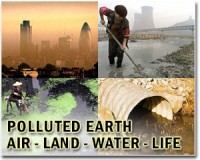| . |  |
. |
Madrid, Spain (SPX) Apr 11, 2011 "We were not expecting to find such high levels of PCBs, highly toxic compounds that are considered as priority compounds by European legislation, in a region such as the western coast of Africa", Ailette Prieto, a researcher at the University of the Basque Country (UPV/EHU-Spain) and co-author of a study published in the journal Environmental Science and Technology, tells SINC. PCBs, which some studies have shown to be carcinogenic compounds, were used years ago as dielectric fluids in transformers, condensers and coolants for various devices. However, their production was banned in the United States in 1979 due to their toxicity and persistence in the environment, and they were banned from 2001 onwards in countries such as Spain that signed up to the Stockholm Convention on Persistent Organic Compounds. Now, the team led by researcher Rosalinda Gioia at Lancaster University (United Kingdom), has shown that high concentrations of PCBs (between 10 and 360 picograms/m3) are found in some countries in West Africa, such as the Gambia and Ivory Coast, and all along this coast. For this study, the scientists have carried out several years of research campaigns throughout the region over recent years, taking air samples from the German ship RV Polastern. They also gathered samples from land-based stations (Gambia, Sierra Leone, Ivory Coast and Ghana), and used particle dispersion models to seek the possible sources of the contamination.
Illegal dumping and ship graveyards The study points particularly to the large ships' graveyard in the bay of Nuadibu (Mauritania), which is one of the largest in the world. "Another possible source could be the burning of organic material from forest fires in the region, but we have ruled this out because such cases also release other contaminants (PAHs, polycyclic aromatic hydrocarbons), and we hardly detected any of these", Prieto adds. The data for the study -that has also appeared in Nature News- were collected in 2007 during the ship RV Polastern's scientific expedition of the from Germany to South Africa. The samples were collected using "sponges" that substances in the air stick to. Subsequently, these samples were frozen and examined in European laboratories, including the Department of Analytical Chemistry at the UPV in Bilbao. The team repeated the expedition in November 2010, and the latest samples are currently being analysed. Rosalinda Gioia, Sabine Eckhardt, Knut Breivik, Foday Jaward, Ailette Prieto, Luca Nizzeto y Kevin C. Jones. "Evidence for Major Emissions of PCBs in the West African Region". Environmental Science and Technology 45 (4): 1349-1355, enero de 2011. DOI: 10.1021/es1025239.
Share This Article With Planet Earth
Related Links FECYT - Spanish Foundation for Science and Technology Our Polluted World and Cleaning It Up
 EU declares war on plastic litter in Mediterranean
EU declares war on plastic litter in MediterraneanAthens (AFP) April 8, 2011 EU Environment Commissioner Janez Potocnik on Friday declared war on marine litter fouling the Mediterranean, calling for continental mobilisation including a possible ban on plastic bags. "Marine litter is a big, big problem. I am determined to address it," he told an Athens conference attended by environmentalists and representatives of the plastic industry. "I invite you to join us and sa ... read more |
|
| The content herein, unless otherwise known to be public domain, are Copyright 1995-2010 - SpaceDaily. AFP and UPI Wire Stories are copyright Agence France-Presse and United Press International. ESA Portal Reports are copyright European Space Agency. All NASA sourced material is public domain. Additional copyrights may apply in whole or part to other bona fide parties. Advertising does not imply endorsement,agreement or approval of any opinions, statements or information provided by SpaceDaily on any Web page published or hosted by SpaceDaily. Privacy Statement |